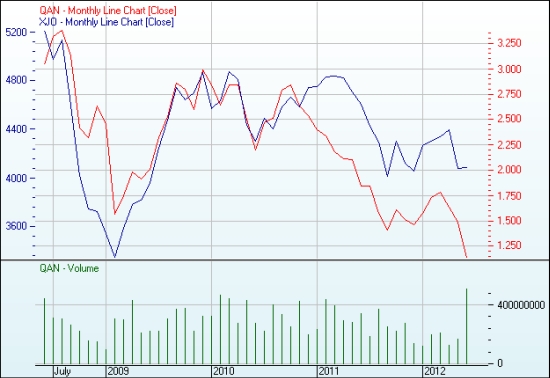Search
Recent comments
- corrupt....
27 min 50 sec ago - laughing....
2 hours 21 min ago - meanwhile....
3 hours 50 min ago - a long day....
5 hours 44 min ago - pressure....
6 hours 32 min ago - peer pressure....
21 hours 50 min ago - strike back....
21 hours 56 min ago - israel paid....
22 hours 59 min ago - on earth....
1 day 3 hours ago - distraction....
1 day 4 hours ago
Democracy Links
Member's Off-site Blogs
quaint arse .....
from Crikey …..
Qantas pleads for govt protection from the Joyce discount
Crikey Canberra correspondent Bernard Keane writes:
ALAN JOYCE, AVIATION, COMPETITION, ETIHAD, QANTAS, VIRGIN AUSTRALIA
Despite his Irish heritage, Alan Joyce is the consummate Australian businessman. No one better personifies the current tendency of many of our most prominent to blame all their problems on others -- their employees, the government, their customers, evil foreigners -- and to demand that governments do something about it.
The latest lesson from the Alan Joyce school of managerial excellence emerges today with Fairfax reports about Qantas lobbying parliamentarians to block Etihad's investment in its rival Virgin, on the grounds that a cashed-up Virgin could, well... compete more effectively with Qantas.
According to the Fairfax report, Qantas is warning it could be forced to shut down. Yes, shut down -- Qantas expects to make $600 million from its domestic operations this year, up $50 million on the previous year. Virgin's entire half-year profit to December was $96 million.
At least the "shut down" threat is a variant on the traditional Qantas threat that if anyone was allowed to compete with it, it would be forced to close unprofitable regional routes, a claim that invariably alarmed rural and regional MPs and that underpinned years of aviation protectionism run by the federal Department of Transport, whose bureaucrats enjoyed multiple junkets a year (via the pointy end of the plane) to negotiate aviation rights that fiercely protected Australian consumers from the benefits of competition.
What's happened over time is that competition has - in the funny way it tends to - exposed Qantas' management, in the same way former monopolies invariably struggle to adjust to life after gouging. And, in particular, that of Alan Joyce. The Qantas share price now carries a substantial Joyce discount. The graph above shows the performance of Qantas shares since Joyce came on board (sorry) in November 2008, compared to the ASX 200, from the ASX site.
Under Joyce, Qantas began seriously underperforming in the market in late 2010 and the gap has only widened, albeit slowly, since then. Joyce's main reaction was to declare war on his workforce, blame the Fair Work Act and promise grand offshore ventures that came to nought. Now, it appears, he has fallen back on the Qantas tradition of demanding protection from competition, at the direct expense of Australian consumers.
It's the sign of a CEO and management team apparently bereft of ideas about how to respond to competitors, some of whom, yes, are government subsidised, but others of whom, like Virgin, have simply exploited Qantas's own ineptitude.
- By John Richardson at 23 Jun 2012 - 7:55am
- John Richardson's blog
- Login or register to post comments

flying thieving class .....
Qantas and Virgin Australia are facing calls to lower their fuel surcharges on tickets after a 25 per cent fall in jet fuel prices over the past three months.
Australia's largest travel agent, Flight Centre, said airlines had been quick to impose extra charges to cover higher fuel costs but had been slow to respond when they dropped.
Since March, when Qantas last raised its surcharges, jet fuel prices have fallen 25 per cent to just $US103 a barrel, their lowest level since December 2010.
A passenger flying Qantas from Australia to London has to pay $380 for fuel surcharge on a one-way ticket, while on a flight to the US it is $340. Virgin charges $310 in fuel levies for a flight to Los Angeles.
Although low fares spurred by intense competition have shielded travellers from the surcharges to an extent, Flight Centre said it expected airlines to lower the surcharges when fuel prices dropped significantly. ''It is hard to fathom why they don't decrease as much as they increase,'' a spokesman said.
The strong Australian dollar has also provided Virgin and Qantas with a cushion against high fuel prices because they buy it in US dollars.
Airlines cannot dramatically increase overall ticket prices by raising surcharges because travellers would opt for rival carriers which do not impose the extra charges.
But they can boost revenue from people redeeming loyalty points because the schemes often do not cover the fuel surcharges. It means passengers have to fork out for the surcharges.
A High Court ruling in 2010 forced airlines to include fuel surcharges in the commissions they pay to travel agents on international ticket sales. But travel agents complain that some airlines are still paying smaller margins on the fuel component of the ticket than they would if it was part of the full fare.
Qantas said the surcharges on its tickets were ''appropriate'' because the fuel bill for the group, which includes Jetstar, reached a record $4.4 billion last financial year, compared with $3.6 billion previously.
''We monitor the jet fuel market closely and whenever we change surcharge levels we make an announcement to the market. However, we do not speculate publicly about what might happen to fuel prices or surcharges in future,'' a spokesman said.
Virgin said it monitored fuel prices and considered ''increases or decreases to our fuel surcharges and fares in line with this''. ''We are very conscious of balancing our commitment to providing competitive fares with the operational costs of our business,'' a spokeswoman said.
Airlines Slow To Cut Surcharges